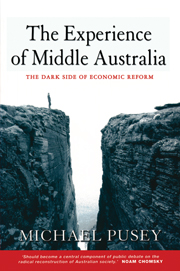Book contents
- Frontmatter
- Contents
- List of Illustrations
- Preface
- Abbreviations
- Chapter 1 The Experience of Economic Reform
- Chapter 2 Incomes and Their Meanings
- Chapter 3 Jobs, Work and Fairness in the Wake of Labour Market Reform
- Chapter 4 Working Families: Struggling with the Costs of Reform
- Chapter 5 Civil Society and Communities
- Chapter 6 Politics, Power and Institutions
- Chapter 7 Judgements on Economic Reform
- Appendix A Chronology of Economic Reform
- Appendix B Methods and Procedures: Middle Australia Project
- Appendix C Supplementary Tables
- Appendix D Income and Equivalent Household Income
- Notes
- Index
Chapter 1 - The Experience of Economic Reform
Published online by Cambridge University Press: 22 September 2009
- Frontmatter
- Contents
- List of Illustrations
- Preface
- Abbreviations
- Chapter 1 The Experience of Economic Reform
- Chapter 2 Incomes and Their Meanings
- Chapter 3 Jobs, Work and Fairness in the Wake of Labour Market Reform
- Chapter 4 Working Families: Struggling with the Costs of Reform
- Chapter 5 Civil Society and Communities
- Chapter 6 Politics, Power and Institutions
- Chapter 7 Judgements on Economic Reform
- Appendix A Chronology of Economic Reform
- Appendix B Methods and Procedures: Middle Australia Project
- Appendix C Supplementary Tables
- Appendix D Income and Equivalent Household Income
- Notes
- Index
Summary
What matters is the expectations of the middle class. Disappointed middle class expectations cause revolutions, and the middle class is now being told that their old expectations are out of date. Fewer of them are going to be able to own their own homes. They are going to live in a very different world where inequality rises and where real wages fall for most of them. The era of annual wage increases is over; they cannot expect rising standards of living over their lifetimes or for their children.
Lester ThurowAnyone who turned forty with the new millennium will have spent all their adulthood living through what we so blithely call ‘economic reform’. Everyone knows what it is. Deregulation, privatisation, labour market reform, user pays, tax reform, cutting government spending, more competition, tax reform (the GST), and – the latest instalment – welfare reform. Watch this space, we are assured there will be more!
Yes, but have you benefited from it? Have I, but not you, benefited from it? How? In what way? Has it been good for the nation? Did we have to have it in the first place? Were there alternatives? Was reform an economic necessity or a political choice, or both? If both, then in what combination? Blind Freddie can guess that, once opened, these questions will be hotly contested. They are in the Academy.
- Type
- Chapter
- Information
- The Experience of Middle AustraliaThe Dark Side of Economic Reform, pp. 1 - 18Publisher: Cambridge University PressPrint publication year: 2003



